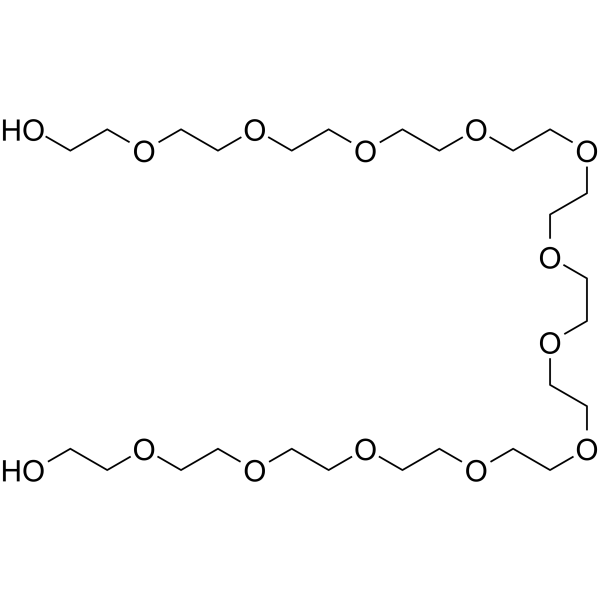
HO-PEG13-OH
CAS No. 17598-96-8
HO-PEG13-OH( —— )
Catalog No. M26963 CAS No. 17598-96-8
HO-PEG13-OH is a PEG-based PROTAC linker that can be used in the synthesis of PROTACs.
Purity : >98% (HPLC)
 COA
COA
 Datasheet
Datasheet
 HNMR
HNMR
 HPLC
HPLC
 MSDS
MSDS
 Handing Instructions
Handing Instructions
| Size | Price / USD | Stock | Quantity |
| 100MG | 26 | In Stock |


|
| 200MG | Get Quote | In Stock |


|
| 500MG | Get Quote | In Stock |


|
| 1G | Get Quote | In Stock |


|
Biological Information
-
Product NameHO-PEG13-OH
-
NoteResearch use only, not for human use.
-
Brief DescriptionHO-PEG13-OH is a PEG-based PROTAC linker that can be used in the synthesis of PROTACs.
-
DescriptionHO-PEG13-OH is a PEG-based PROTAC linker that can be used in the synthesis of PROTACs.(In Vitro):PROTACs contain two different ligands connected by a linker; one is a ligand for an E3 ubiquitin ligase and the other is for the target protein. PROTACs exploit the intracellular ubiquitin-proteasome system to selectively degrade target proteins.
-
In VitroPROTACs contain two different ligands connected by a linker; one is a ligand for an E3 ubiquitin ligase and the other is for the target protein. PROTACs exploit the intracellular ubiquitin-proteasome system to selectively degrade target proteins.
-
In Vivo——
-
Synonyms——
-
PathwayOthers
-
TargetOther Targets
-
RecptorFlk1| KDR| PDGFRβ| VEGFR2
-
Research Area——
-
Indication——
Chemical Information
-
CAS Number17598-96-8
-
Formula Weight590.704
-
Molecular FormulaC26H54O14
-
Purity>98% (HPLC)
-
Solubility——
-
SMILESOCCOCCOCCOCCOCCOCCOCCOCCOCCOCCOCCOCCOCCO
-
Chemical Name——
Shipping & Storage Information
-
Storage(-20℃)
-
ShippingWith Ice Pack
-
Stability≥ 2 years
Reference
1.Serban F, et al. Silencing of epidermal growth factor, latrophilin and seven transmembrane domain-containing protein 1 (ELTD1) via siRNA-induced cell death in glioblastoma. J Immunoassay Immunochem. 2017;38(1):21-33.
molnova catalog



related products
-
Notoginsenoside R1
Notoginsenoside R1 has been shown to exhibit antioxidant, antiapoptotic, anti-inflammatory, and immune-stimulatory properties.
-
7-ethyl-2-methylunde...
7-ethyl-2-methylundecan-4-ol is a surfactant that can be used in softeners, shampoos, soaps, detergents and other products.
-
(Iso)-RJW100
(Iso)-RJW100 is a potent liver receptor homolog 1 (LRH-1, NR5A2) and steroidogenic factor-1 (SF-1, NR5A1) agonist with pEC 50 s of 6.4 and 7.2, respectively.



 Cart
Cart
 sales@molnova.com
sales@molnova.com


